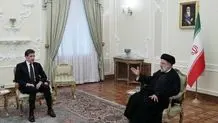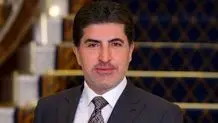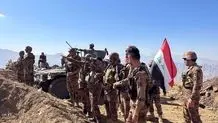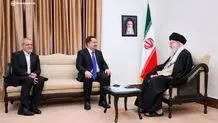President of the Kurdistan Region of Iraq:
We will not allow Iran's security to be threatened
The head of the Iraqi Kurdistan Region stated that an "important chapter and new stage" has been reached in strengthening relations between Iran and the region, emphasizing that security measures and border surveillance have been strengthened to prevent any activity that could affect the stability of the borders between the two sides.
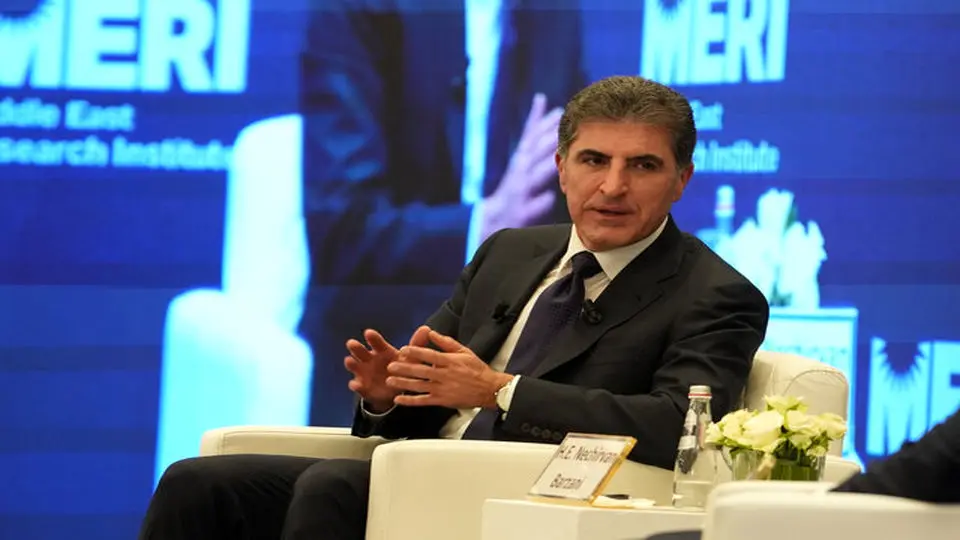
ISNA - In an exclusive interview with ISNA, Nechirvan Barzani, the President of the Kurdistan Region of Iraq, answered questions about Tehran-Erbil relations, the follow-up of agreements made during the visits between the parties, and the issue of the Iran-Iraq security agreement.
Barzani said that the visit of the President of the Islamic Republic of Iran, Masoud Pezeshkian, to the Kurdistan Region, as well as his visit to Tehran, was an “important stage and chapter and a new stage in strengthening relations” between the parties.
The President of the Kurdistan Region of Iraq also announced that “the relevant bodies and agencies of Iraq and Iran are monitoring and following up on the implementation and implementation of agreements in various sectors, including economic, security, and cultural cooperation.”
He continued by saying that “both sides should consider solutions to speed up and facilitate customs, trade movements, and the exchange of goods at border gates.”
Barzani stated that “good progress is being made in implementing the security agreement between Iran and Iraq,” and emphasized that Iran’s peace and security will not be allowed to be threatened from the Kurdistan Region.
The full text of this interview is as follows:
Question: What impact did the visit of the President of the Islamic Republic of Iran to the Kurdistan Region of Iraq in September have on the deepening of political, economic, cultural, and security relations between Tehran and Erbil?
Answer: The Islamic Republic of Iran is an important neighbor of Iraq and the Kurdistan Region. We in the Kurdistan Region have historical relations with Iran. President Pezeshkian's visit to the Kurdistan Region, and before that, my visit to Tehran and meeting with the Supreme Leader of the Islamic Republic of Iran and high-ranking officials of the country, were an important stage and chapter and a new phase in strengthening these relations. Dr. Pezeshkian's visit to the Kurdistan Region was a source of joy for us and an emphasis on the historical and cultural relations between us. This led to the strengthening of comprehensive cooperation between Erbil and Tehran, and in particular, the importance of continuous dialogue between Iraq and Iran to ensure greater stability and tranquility on the borders and for the region as a whole.
Economically, the parties discussed how to expand exchanges and expand the volume of exports and imports of commercial goods between the parties, as well as opening new horizons for cooperation and joint production in various sectors. Culturally, there is a shared importance in strengthening academic and scientific cooperation, as well as cultural exchanges and exchanges between relevant organizations, agencies, and institutions on both sides.
In terms of security, both parties emphasized the importance of maintaining stability and tranquility on the common borders and coordinating and making the best efforts to confront security risks and threats, in a way that is in line with and serves the interests of both parties.
Question: To what extent have the agreements reached during the Iranian President’s visit to the Kurdistan Region between the two sides been implemented, and how are they monitored and followed up?
Answer: The relevant Iraqi and Iranian bodies and agencies are monitoring and following up on the implementation of these agreements in various sectors, including economic, security, and cultural cooperation. The amount of trade between Iraq and Iran is more than $10 billion annually, 60 percent of which is conducted through the Kurdistan Region. We want to increase this amount even further, as much as we can and the framework of Iraqi laws and regulations allows us. To achieve this important goal, we will examine the existing and necessary solutions and, in this regard, consider the possible facilitation of trade exchanges.
Regarding security partners, within the framework of the Iraq-Iran agreement, there is ongoing coordination between the Kurdistan Region and the Iraqi Federal Government in Baghdad to implement security agreements between the two sides; In addition to all this, with full commitment and confidence, nothing will be allowed to threaten the comfort and security of Iran from the soil of the Kurdistan Region.
Question: Given the determination of both sides to deepen relations, especially in the economic field, what are the most important obstacles facing it?
Given that there is a common will and great desire on the part of both sides to strengthen economic relations, there is no doubt that a number of obstacles and challenges create problems in the way of this valuable desire; for example, there are a number of logistical obstacles at border gates and crossings. Both sides must consider solutions to speed up and facilitate customs and trade movements and exchanges of goods at border gates. Also, the private sector on both sides must become more active and its work made easier for them and be provided with the necessary support and assistance so that they can play their role more actively and effectively.
On the other hand, the issue of economic sanctions imposed on Iran may also affect a number of areas of economic and trade cooperation. Also, the difference between customs and financial policies between Baghdad and the Kurdistan Region, which also has its own effects and requires further dialogue to ensure ease of production and trade. In this regard, the Kurdistan Region delegations are engaged in discussions and consultations with the federal government in Baghdad to resolve them.
Question: How is the current development of the Iran-Iraq security agreement going and have terrorist groups been evacuated from the common border areas?
Answer: Good progress is being made in the implementation of the Iran-Iraq security agreement. Baghdad, in coordination with the Kurdistan Region, is working to ensure that all clauses of the agreement are fulfilled. In this regard, serious steps have been taken to establish and maintain stability and tranquility on the borders, and a mechanism has been established to monitor these areas to prevent any activity that threatens the security and well-being of the Islamic Republic of Iran.
The Kurdistan Region is committed to not allowing any group to use the territory of the region as a source of threat to the security and well-being of neighboring countries, especially Iran. We are constantly working on this issue and are coordinating with Baghdad to ensure full compliance with this agreement. This is a very serious issue for us, and we attach great importance to making understandings and implementing agreements.
Question: What steps has the Kurdistan Region of Iraq taken to support and advance the implementation of the security agreement between Iran and Iraq?
Answer: The organs and agencies of the Kurdistan Regional Government are closely coordinating with the federal Iraqi government to implement the provisions of the agreement, including those related to the evacuation of border areas or the exchange of necessary information. Security measures and border surveillance have been strengthened to prevent any activity that could affect the stability of the borders between the two sides.
Also, within the framework of this Iraq-Iran agreement, continuous work and efforts are being made to strengthen comprehensive cooperation with Iran; to ensure the maintenance of stability in the border areas and strengthen bilateral relations in a way that serves the interests of both parties and addresses the concerns of both parties, since maintaining security and stability of the borders is a shared responsibility.
آخرین اخبار Politics را از طریق این لینک پیگیری کنید.

